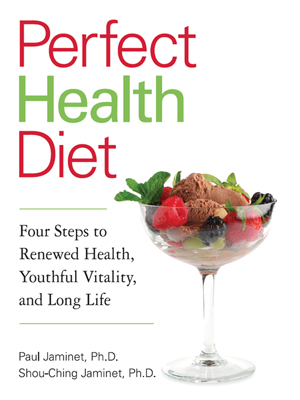The Perfect Health Diet
The Perfect Health Diet is more than just a diet — it is a program for perfect health.
Keys to the diet include:
- Keep daily carbohydrate intake around 400 calories, primarily from starches (e.g., rice, potatoes, sweet potatoes, taro), fruits, and berries. Eat a variety of vegetables as well, but don’t count them as calorie sources. Protein should be a modest fraction of daily calories — 200 is enough, but eat to taste. Fats should supply most (~65-70%) daily calories.
- Do not eat toxic foods. Notably:
- Do not eat cereal grains — wheat, barley, oats, corn — or foods made from them — bread, pasta, breakfast cereals, oatmeal. Do not eat legumes. The exception is white rice, which we count among our “safe starches.” Rice noodles, rice crackers, and the like are fine.
- Do not eat foods with added sugar or high-fructose corn syrup. Do not drink anything that contains sugar: healthy drinks are water, tea, and coffee.
- Polyunsaturated fats should be a small fraction of the diet (~4% of total calories). To achieve this, do not eat seed oils such as soybean oil, corn oil, safflower oil, sunflower oil, canola oil, or the like. The best cooking oils are coconut oil, clarified butter, and beef tallow; palm oil, lard, olive oil, and avocado oil are next best. Nut butters are another possible source of fats.
- Take care to obtain adequate amounts of eight critical micronutrients: vitamin D, vitamin K2, iodine, selenium, magnesium, copper, chromium, and vitamin C. Many of these can be obtained from sunlight (vitamin D) or what we call “supplemental foods”: seaweed for iodine, Brazil nuts for selenium, beef liver for copper. Others may need to be supplemented. Some nutrients should not be supplemented: for instance, we recommend that you do NOT take fish oil capsules for omega-3 fats, but DO eat oily fish like salmon or sardines.
We will discuss on the blog ways to modify the diet for certain diseases. Some conditions, such as epilepsy, brain and other cancers, and some mental health and neurological disorders, may benefit from very low-carb ”ketogenic” diets. Other conditions, such as chronic fungal infections, may benefit from larger starch consumption.
More details about the diet can be found in our forthcoming book, Perfect Health Diet: Four Steps to Renewed Health, Youthful Vitality, and Long Life. Until the book is available at online retailers, we’re making it available here. With a purchase you’ll get an immediate download of an early draft in PDF, and we’ll send you a physical copy of the final book as soon as it is available. To buy the book through us, click “Add to Cart”:


No comments:
Post a Comment